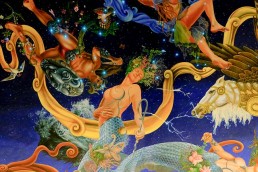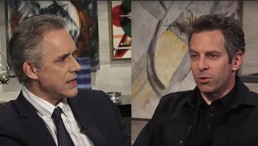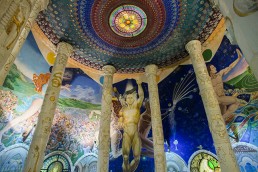We live in very interesting times. We are at a threshold between the crashing down of old myths and the creation of new ones. Who will create them?
Until about 100 years ago, religion – and its myths – was the only truth offered to the people. If you were born in Italy, you would be Catholic. If you were born in Israel, you would be Jewish. If you were born in India, you would be Hindu. Religion was not a choice but merely belonging to a territorial divinity, a divinity of a certain nation, land or people. Each God was the Only God, negating the possibility that others exist.
We live in very interesting times. We are at a threshold between the crashing down of old myths and the creation of new ones. Who will create them?
Until about 100 years ago, religion – and its myths – was the only truth offered to the people. If you were born in Italy, you would be Catholic. If you were born in Israel, you would be Jewish. If you were born in India, you would be Hindu. Religion was not a choice but merely belonging to a territorial divinity, a divinity of a certain nation, land or people. Each God was the Only God, negating the possibility that others exist.

Let’s fast forward through 100 years and a lot of scientific and technological development. We as human beings seem to have noticed that there are Gods other than our own. There are stories and myths from other religions that seem quite similar to ours, if we look for similarities. Internet has made it profoundly clear. We can see that in many religions, God is represented by the Sun, and the birth of the Gods takes place at the end of the calendar year. We see that across many beliefs, word is powerful, and so on…
It seems that religions carry archetypal stories, ones that represent our way of coping in this chaotic world, where we seem to have forgotten why we are here and where are we going, not to mention… well… who are we?
How does this change impact our lives? The crashing down of old myths seems to destabilize our foundation. What should we replace them with? This amazing potential in our times is skillfully presented in the debate between Jordan Peterson and Sam Harris. An incredible series of 4 two-hour videos shows a debate that speaks about the legitimacy of holding onto religion in any form, as a prerequisite for living a good life.

In this debate, Jordan, a Canadian clinical psychologist and university professor, defends the importance of holding onto religious stories, because – independently of them being true or false – they do offer an ethical landscape that is useful for creating a functional society. He claims that it is not so important whether you consider yourself an atheist or a religious person, but rather how you act. Many atheists do behave as believers, and religious myths are so ingrained in our society that they can be considered an unconscious layer impacting everyone’s behavior.
On the other hand, Sam, an American author, philosopher, neuroscientist and critic of religion, presents the idea that not only do we not need religion and its stories, they are profoundly dangerous since they openly incite aggressive behavior (killing people in the name of God) and require belief in something that science proved wrong. Sam advocates that religion can be replaced with… well, Reason. It is easy to say that myths can vanish into nothingness and reason will flourish, but is this a reasonable belief?

In Damanhur, we can see that both sides can be considered partly true, and in the last 40+ years, we have proven that these viewpoints are reconcilable. Since the very beginning, we have considered Damanhur a philosophy and not a religion. The important distinguishing element is the acceptance of dogma. A religion demands ultimate faith from a believer, and many of the facts are considered dogmatic. That is, you as a believer cannot go beyond dogma. Philosophy also considers faith as a key alchemical element of the human seeking for truth, but on this path, at a certain point, faith transmutes into knowledge that is acquired by experience. At Damanhur we celebrate rituals. We communicate with divinities and study their histories. We research myths. Although, we do know that we are the ones choosing these stories. For us, spirituality is not static dogma but constantly discovering new meanings. There are archetypes we still have not discovered, and we know that are key elements to be able to express our full potential, and this is why we welcome new mythology and new stories. We need stories that will unlock the potential we have not tapped into yet. So, each one of us looks at the past with fresh eyes, to tell the new stories being born.
In case you are interested in watching the debate mentioned in this article, you can find the 4 two-hour long videos here. It lasts 8 hours, but we promise it is worthwhile.
What is your point of view about the clash between science and religion? Do you have a new story where these seemingly opposite fields are reconcilable?







